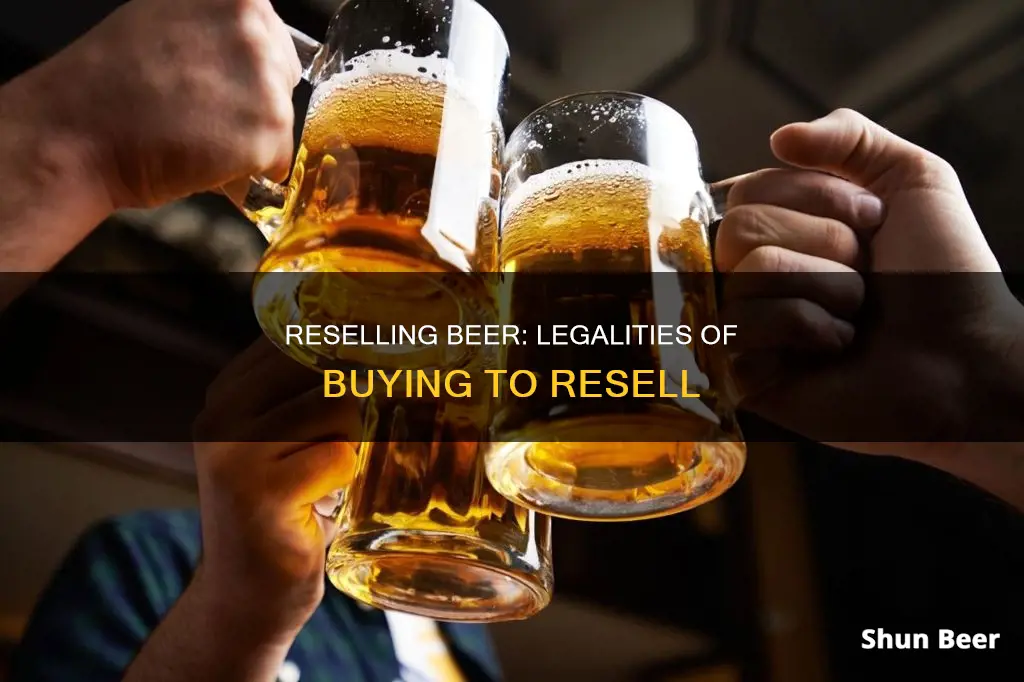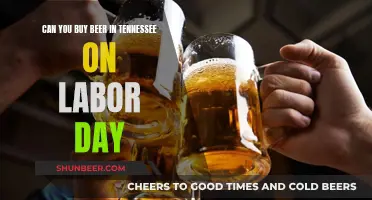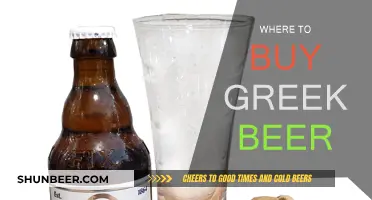
The resale of beer is a complex and regulated area that varies by jurisdiction. In the United States, for example, the Alcohol and Tobacco Tax and Trade Bureau (TTB) outlines specific requirements for retail dealers of beer, wine, and spirits. These dealers must register with the TTB and comply with federal laws and regulations to avoid severe penalties and criminal prosecution. Obtaining a license to sell alcoholic beverages is a privilege and not a right, and it is subject to compliance with the law. Different types of retail licenses exist, such as on-sale and off-sale licenses, each with their own set of authorized activities. It is essential to understand and adhere to the specific regulations in your region to ensure legal compliance when considering reselling beer.
| Characteristics | Values |
|---|---|
| Can I buy beer and resell it? | Yes, but you need a license. |
| License | A permit to do something that would otherwise be unlawful. |
| License types | On-sale general, off-sale general, on-sale beer and wine, off-sale beer and wine, on-sale beer, club license, etc. |
| License requirements | Must be over 21 years old, no criminal record, etc. |
| License restrictions | Cannot be within the immediate vicinity of churches and hospitals, must be at least 600 feet from schools, public playgrounds, and nonprofit youth facilities, etc. |
| License transfer | Must be approved by ABC, cannot be assumed to be transferred just because an application has been filed. |
| License renewal | Must be renewed before the license expires, can be renewed up to 60 days after expiration with a penalty fee. |
What You'll Learn
- Retail dealers must register with the Alcohol and Tobacco Tax and Trade Bureau (TTB)
- Retail dealers must amend their registration if they move their business or if there is a change in ownership
- Retail dealers must obtain a wholesaler's basic permit to sell to another dealer for purposes of resale
- Retail dealers must securely affix a tamper-evident closure to bottles of distilled spirits
- Refilling or reusing liquor bottles is prohibited

Retail dealers must register with the Alcohol and Tobacco Tax and Trade Bureau (TTB)
If you are a retail dealer of beer, wine, or distilled spirits, you must register your business with the Alcohol and Tobacco Tax and Trade Bureau (TTB). This is a requirement for any business selling or offering to sell these types of alcoholic beverages. Registration must be done before engaging in business and for every location of the business. Additionally, registration must be amended if there is a change in the business location or a change in ownership or control of the business.
To register, you need to fill out and submit TTB F 5630.5d - Alcohol Dealer Registration. This can be done through the Permits Online system on the TTB website. It is important to note that even if you are a brewer, proprietor of a distilled spirits plant, or owner of a bonded wine cellar, you are not exempt from this registration requirement. However, your application to establish and operate these businesses will automatically register you as a dealer at that location.
As a retail dealer, you must also comply with other TTB regulations, such as requirements for closures on bottles of distilled spirits, restrictions on refilling or reusing liquor bottles, and permitted sources for purchasing distilled spirits. Failure to comply with these requirements can result in severe penalties and criminal prosecution.
The TTB provides resources and guidance to help retail dealers understand and comply with the applicable laws and regulations. The TTB's National Revenue Center can be contacted for more information or clarification on any requirements that are unclear.
Best Places to Buy Ultra Light Beer
You may want to see also

Retail dealers must amend their registration if they move their business or if there is a change in ownership
In the United States, retail dealers of distilled spirits, wine, or beer must comply with certain federal laws and regulations. One such requirement is that they must register with the Alcohol and Tobacco Tax and Trade Bureau (TTB) using TTB F 5630.5d.
If there are any changes to the business, such as moving to a new location or a change in ownership, retail dealers must amend their registration using the same form, TTB F 5630.5d. This ensures that the TTB has the most up-to-date information on the dealer's business operations.
The procedure for amending registration due to a change in ownership can vary depending on the business type and the state in which the business is located. For example, in Indiana, if a dealership is owned by a sole proprietorship and there is a change in ownership, the current owner must submit a completed Business Affidavit, notifying the Auto Dealer Services Division that the dealer will be going out of business. This affidavit must be signed and notarized, and the current dealer license, plates, and registrations must be returned. The new owner must then submit a new License Application.
On the other hand, if the dealership is owned by partners, a completed form adding or removing an owner, officer, or partner must be submitted, signed by all partners, and notarized. If there is a complete change in ownership and all partners are removed from the license, the current partners must submit a Ceasing Business Affidavit, and the new owners must submit a new License Application.
In New York, to amend the registration due to a change of address for your business, you must complete a Statement of Ownership and/or Permission to Use Place of Business (VS-19). This process takes around 6 to 8 weeks to be completed and approved.
German Beer: Where to Buy the Best Brews
You may want to see also

Retail dealers must obtain a wholesaler's basic permit to sell to another dealer for purposes of resale
If you are a retail dealer of beer, wine, or distilled spirits, you must comply with certain requirements of federal laws and regulations. One such requirement is that you must obtain a wholesaler's basic permit under the Federal Alcohol Administration Act to sell to another dealer for purposes of resale.
A retail dealer becomes a wholesale dealer when selling beer, wine, or distilled spirits to another dealer other than a limited retail dealer. By law, a retailer who sells or offers for sale beer, wine, or spirits in quantities of 20 wine gallons (75.7 liters) or more to the same person at the same time is presumed to be engaged in business as a wholesale dealer. The seller may overcome this presumption by providing evidence that the sale was made to a non-dealer.
To obtain a wholesaler's basic permit, you must apply through the Alcohol and Tobacco Tax and Trade Bureau (TTB). You can obtain the necessary forms from the TTB's National Revenue Center. It is important to note that persons who violate any of the permit requirements become liable to penalties.
In addition to federal requirements, each state may have its own set of regulations regarding wholesaling. For example, in California, a wholesale license is referred to as a seller's permit. Therefore, it is essential to check the laws and regulations in your specific state or location.
Finding Hamms Beer: A Guide to Retailers and Distributors
You may want to see also

Retail dealers must securely affix a tamper-evident closure to bottles of distilled spirits
In the United States, liquor laws and regulations for retail dealers of distilled spirits, wine, or beer are governed by the Alcohol and Tobacco Tax and Trade Bureau (TTB). These laws and regulations outline the requirements that retail dealers must comply with to avoid severe penalties and criminal prosecution.
One of the critical requirements for retail dealers is to securely affix a tamper-evident closure to bottles of distilled spirits. This mandate falls under the closures on bottles of distilled spirits section of the TTB regulations. It states that distilled spirits plants and importers must securely attach a tamper-evident closure or similar device to all bottles or other containers of distilled spirits. This includes whiskey, gin, rum, brandy, vodka, cordials containing distilled spirits, and similar liquors.
The tamper-evident closure must be designed so that it is broken when the container is opened, leaving a portion of the closure on the container. This ensures that any tampering or unauthorized access to the contents is evident to the consumer. Examples of acceptable closures include proprietary paper seals, metal roll-ons, plastic pilfer-proof caps, lead foil capsules with zip tabs, cello-seals with zip tabs, strip stamps, and similar devices.
Retailers have a responsibility to report any liquor bottles received without the required closures or with broken closures to a TTB officer. This helps maintain the integrity of the product and protects consumers from potential tampering or adulteration.
By adhering to these regulations, retail dealers can ensure compliance with federal laws and provide their customers with distilled spirits that meet the necessary safety and security standards.
Pittsburgh's Best Beer: Where to Buy Your Favorite Brews
You may want to see also

Refilling or reusing liquor bottles is prohibited
The reasons for this prohibition are twofold. Firstly, there is the issue of tax avoidance. Each bottle of liquor is taxed either by the bottle or by volume, and reusing liquor bottles constitutes tax fraud. Secondly, and more crucially, is the issue of consumer deception. When a liquor bottle is refilled, the label on the bottle no longer reflects the contents, which are only known to the person who refilled it. This can lead to cross-contamination, as well as the harmful practice of refilling bottles with counterfeit liquor.
The penalties for refilling or reusing liquor bottles can be severe. Any retail dealer, or agent or employee of such a dealer, who engages in this practice is subject to a fine of up to $1000, imprisonment for up to 1 year, or both. It is important to note that the federal government must prove beyond a reasonable doubt that the violation has occurred.
The prohibition on refilling and reusing liquor bottles is an important measure to protect consumers and maintain the integrity of the liquor industry. It is crucial that retailers and dealers comply with this regulation to avoid legal consequences and ensure the safety of their customers.
Buying Beer: A Guide to Choosing the Perfect Brew
You may want to see also
Frequently asked questions
Yes, you need a license to buy and resell beer. The type of license depends on the type of beer you want to sell and the location of your business.
There are four types of retail licenses: On-Sale General, Off-Sale General, On-Sale Beer and Wine, and Off-Sale Beer and Wine.
To get a license to sell beer, you need to apply to the Alcoholic Beverage Control (ABC) board in your state. The process typically involves submitting an application, paying a fee, and undergoing an investigation to ensure that you meet the necessary licensing requirements.
Yes, there are restrictions on selling beer, such as the minimum age requirement for customers and the distance between your business and schools, churches, hospitals, and residences.







